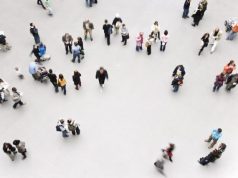Scientists have uncovered that the added influence of confident people may be down to our biology.
By studying brain activity, academics discerned that human brains are geared for placing added value on opinions of confident people.
The research, published today in the Journal of Neuroscience and led by University of Sussex psychologist Dr Daniel Campbell-Meiklejohn, pinpointed a region of the brain that responds to confident (but not unconfident) opinions of others when making decisions.
The scientists examined the active brains of 23 healthy volunteers and found that expectations of success could be influenced by three key elements: personal experience, learning what the majority people believe and, most importantly, learning what confident people believe.
The first two had widespread effects on the brain’s reward system, which predicts how satisfied we will be when we choose something. Opinions of confident people, however, had an additional effect on this reward system – and only in a part of the brain that appeared late in our evolution.
Discussing the research, Dr Campbell-Meiklejohn said:
Find your dream job in the space industry. Check our Space Job Board »
“This additional effect seems likely to be the mechanism by which the confidence of others can give us reassurance in our actions. Our findings suggest that social transmission of beliefs and preferences is not as straightforward as copying the person next to you. Other elements are clearly at play during the decision-making process.”
The researchers observed that this extra activity occurs next door to a brain area that helps us consider what others are thinking. This is important for the next step, which is to figure out what the brain is actually doing when we observe confident people.
“We can now consider that this part of the brain may be inferring, correctly or incorrectly, the quality of the confident person’s information before deciding whether or not to let that person change our beliefs,” adds Dr Campbell-Meiklejohn.
“In today’s political climate in particular, we should be aware that when facts aren’t clear, we may be biologically tuned to allow seemingly confident people to hold more sway on our own beliefs.”
The study was completed in conjunction with researchers at Aarhus University, University College London and Princeton University.
Source: University of Sussex
Research Reference:
D. Campbell-Meiklejohn et al. Independent Neural Computation of Value from Other People’s Confidence, Journal of Neuroscience (2016). DOI: 10.1523/JNEUROSCI.4490-15.2016










